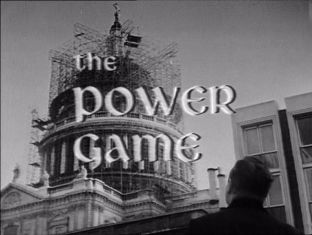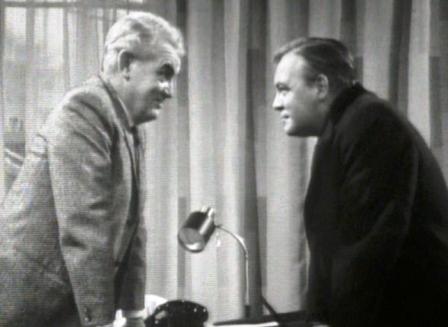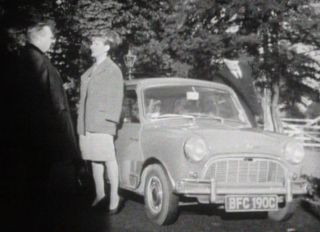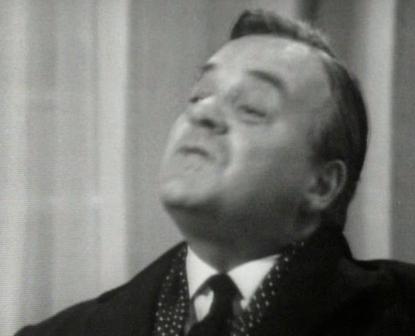
13 December 1965
The New Boy. Writer Edmund Ward. Director Victor Menzies
"Put the megaphone away, Bligh. I’m not one of the terrified mediocrities you’ve gathered around you!" Sir John Wilder
Less than a year after the end of The Plane Makers, the first episode of The Power Game opens with Sir John Wilder, finally knighted but finding the quiet life "beginning to pall a little". Apart from a seat on the National Export Board, his only business activity is a directorship with Elbertson's Merchant Bank which is negotiating a finance agreement with Bligh Construction.

For Wilder's old antagonists Sir Gordon Revidge (Norman Tyrrell) and Sir Gerald Merle (William Devlin), Bligh Construction offers, “a high profit outlet for our overseas funds.” Caswell Bligh (Clifford Evans) is willing to accept an Elbertson’s nominee as joint Managing Director, so long as he has very little control over activities. Bligh has outside interests as President of a lobbying organisation called the National Motorways Council, but still keeps a firm hand on the company which he built up from an excavator in a stone quarry 35 years ago. As one of the Elbertson’s Board, Courtney (John Brooking) comments, “Bligh’s a bit of an oik but no matter.”
Elbertson’s nominee is Sir Gerald Merle MP, who has used his connections with the Treasury to ensure that the transfer of funds will not be opposed. However, Wilder begins to manoeuvre, inspiring Bligh’s son Kenneth (Peter Barkworth) to oppose Merle’s appointment.
Wilder then confounds everyone by refusing to accept the nomination on the terms offered by Bligh. He demands full control of the funds allocated by the bank to Bligh construction. Confronting Bligh, Wilder first makes an appeal to logic. The firm’s balance sheet is high on “work in hand”. While this talks about contracts they hope to win, getting them signed is another matter. Wilder thinks he can close the deals.

Bligh is still dismissive, so Wilder appeals to emotion. Kenneth wants control of Bligh Construction. “Though he doesn’t know it yet, he’s got to cut somebody’s throat to do it. Yours. Or mine, if I’m here. Which would you prefer?”
"We had a cat once, who could get into almost any cage you'd care to mention. He'd just study the cage for a couple of hours and then smirk. Just like you..we lost a lot of canaries, but the cat choked to death on feathers." Pamela Wilder to John Wilder.
“The New Boy” marks an assured transition from the last episode of The Plane Makers, which had ended 11 months before. Board room dialogue informs us that Wilder is under-employed and we first see Wilder sitting in his living room in a sweater and open-necked shirt, rather than his customary suit. Don Henderson (Jack Watling) tells Wilder that his former rival David Corbett is “porridge-faced as usual” and busy learning French (implying that Scott-Furlong's aviation rivals now have the upper hand). “When you pulled out the timing was marvellous.” Wilder replies that, “All good exits are.”
To replace Alan Dobie's David Corbett, The Power Game pitted Wilder against a new adversary - Caswell Bligh, played by Clifford Evans. A film actor in the 1930's and 40's, Clifford Evans had starred in one of the early ITV crime series Stryker of the Yard (1957) and had recently starred in the Hammer Films Curse of the Wereworlf (1961) and Kiss of the Vampire (1963).
The rules of the Independent Television Authority, which controlled ITV, meant that in the 1960’s a TV series could not be about any product that might be advertised during the commercial breaks. Producer Rex Firkin had originally identified ships and aircraft as two products that would not be advertised on TV, but road construction was an obvious third alternative. While aviation was in decline, construction was suffering cyclic problems with Wilder telling Bligh, “"You're in a depressed industry, Every time the Government puts in a squeeze, the construction industry yelps."
The appearance of Merle and Revidge in the opening episode provides a sense of continuity (with Devlin delivering some fine silent twitching when Wilder’s sardonic seconding of his nomination to a badly negotiated appointment hits home during the board room scene). Producer Rex Firkin had learnt from his mistake with the third series of “The Plane Makers” and ensured that Barbara Murray and Jack Watling were available to reprise their old roles. Murray is particularly entertaining as she comments on Wilder’s strategies throughout the first episode, telling him that he’ll be wearing patched trousers next when she sees that he’s proposing to travel to the board meeting in the back of a Mini as a sign of humility.

The ending of this first episode mirrors the final episode of “The Plane Makers” with Wilder making his exit once more in a limousine (although this time in triumph). Wilder’s confrontation with Bligh also echoes his final showdown with Corbett ( Alan Dobie), particularly in the throat-cutting metaphor. Although he has been leaning forward aggressively throughout the conversation, Patrick Wymark slowly leans back offering his throat to Clifford Evans at this point. The difference between the two conversations is that where Wilder was making the best of a bad situation at the end of “The Plane Makers”, in “The Power Game”, Wilder is gambling on being able to turn the situation round to his own advantage.

The scene where one of the Elbertson board members refers to Bligh as an “oik” recalls the disparaging remarks about Arthur Sugden’s “background” in the first series of “The Plane Makers” The fact that Bligh controls a multi-million pound empire means his background will be tolerated, whereas for Sugden it was always an obstacle to overcome.
The title sequence for The Power Game was a relative rarity in British drama because it showed each member of the main cast. Clifford Evans, as Caswell Bligh appears to have been tacked on (after the episode title) as an afterthought, although this may have been negotiated by his agent as special billing (similar to Jonathan Harris, with his “Special Guest Star” billing at the end of the “Lost In Space” title sequence).